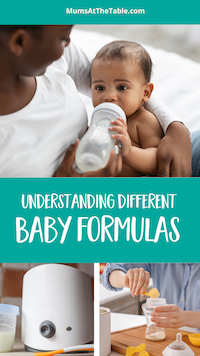With so many types, brands and prices, just where do you start? Which one should you pick? Here’s how to choose the best baby formula for your child.
We share some helpful ways you can find the right formula for your baby’s needs from the various infant formulas available.
No shame in bottle feeding
While breastmilk is known for its optimal nutritional profile, containing essential nutrients, the perfect balance of proteins, fats, vitamins and minerals, along with antibodies that help protect babies from infections and diseases, not every mum is able to breastfeed.
If you can breastfeed, great! But if you can’t, you are certainly not any less of a mum. You shouldn’t feel guilt or shame.
Understanding different baby formulas
When breastfeeding is not possible, infant formulas serve as a valuable alternative. There are several different formulas to consider, each catering to specific needs and preferences. Baby formula in Australia all adhere to the highest and strictest standards. They also have all the nutrients babies need for healthy growth and development. Standard formulas are designed to mimic human milk as closely as possible.
This means choosing standard baby formula really comes down to parents’ brand preference, potential food allergies and maybe baby’s taste preference.
Baby formula is also different to toddler milk drinks. Toddler milk drinks (sometimes marketed as Stage 3 formula) is more about marketing than nutrition.
Choosing the right formula
Selecting the best formula for your baby depends on various factors, including any allergies, intolerances and overall health needs. Here are some tips to help you choose:
- Consult with your paediatrician: Your baby’s doctor can provide valuable insights and recommendations based on your child’s specific health needs.
- Read the ingredients: Check the ingredients list to ensure the formula meets your baby’s nutritional requirements and does not contain any allergens.
- Consider special needs: If your baby has a cow’s milk allergy or lactose intolerance, look for hypoallergenic or lactose-free options.
- Evaluate brands: Research different brands and their reputations. Some parents prefer well-established brands.
Cow’s milk-based formula
This is the most common type of infant formula, made from cow’s milk and processed to be more suitable for babies.
Pros: Readily available and fairly low price.
Cons: Babies can be lactose- (cow’s milk protein) intolerant which can cause digestive issues and immune activation.
Soy-based formulas
This is an alternative for babies who are lactose-intolerant or allergic to cow’s milk protein. Soy formula is made from soy protein and is suitable for babies with specific dietary needs. It’s also an option for families who prefer a plant-based diet.
Pros: Widely available and similarly priced to cow’s milk.
Cons: Babies can also have allergies to soy and there can be confusion as to whether the soy beans are genetically modified or not.
Goat’s milk formula
Some parents opt for goat’s milk formulas as they can be easier for some babies to digest compared to cow’s milk. These formulas also provide essential nutrients.
Pros: Goat milk doesn’t contain lactose which is great for babies who can’t tolerate cow’s milk formula or soy. Is widely available.
Cons: Can be quite a bit more expensive.
Lactose-free formulas
For babies with lactose intolerance, lactose-free formula provides a solution. These formulas replace lactose with other carbohydrates to ensure the baby receives adequate nutrition without digestive discomfort.
Pros: Can be a good alternative to cow’s milk formulas.
Cons: Often these products can have corn syrup or high fructose corn syrup, which has been associated with several long-term health issues.
Organic formulas
Made from ingredients produced without synthetic pesticides or fertilisers, organic formulas can be cow’s milk or soy-based. Parents who prefer organic foods for their families may choose these formulas for their infants.
Pros: Great way to avoid genetically modified ingredients, pesticides and other chemicals in your baby’s diet.
Cons: Significantly higher in price. Sometimes may only be found in health food shops or chemists.
Transitioning to formula
If you have started with breast milk but are now transitioning your baby onto powdered formula, it’s important to do so gradually to help your baby adjust. Start by mixing small amounts of formula with breast milk and gradually increase the proportion of formula over time.
It’s also important to ensure your baby is getting nutritionally certified formulas only, as other drinks such as soy milk and cow’s milk do not have the essential nutrients a growing baby needs.
Fed is best
Ultimately, the best baby formula is the one that meets your baby’s nutritional needs and fits your family’s lifestyle. Whether you choose a cow’s milk-based formula, soy formula or any other type, rest assured that infant formulas are designed to support healthy babies when breastfeeding isn’t an option.
Remember, the most important thing is your baby’s health and wellbeing, and there’s no shame in making the choice that works best for your family. As your baby grows, the amount of milk they require will change. Ensure you read the label to feed your baby as directed, as your six-month-old or 12-month-old baby will require different nutrition to a newborn.
Read next
- Is your baby ingesting microplastics without you realising?
- There are only four things children under five should be drinking. Can you guess which four?

How helpful was this article?
Click on a star to rate it!
0 / 5. 0
Be the first to rate this post!
Adriana Wales
Related posts
Subscribe
Receive personalised articles from experts and wellness inspiration weekly!


